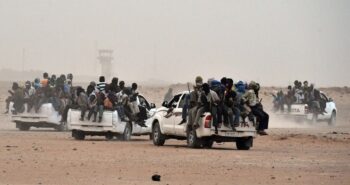By Tim Eaton & Mohamed Eljarh

 Protracted fighting could damage the economy of eastern Libya and undermine the funding model of his Libyan Arab Armed Forces.
Protracted fighting could damage the economy of eastern Libya and undermine the funding model of his Libyan Arab Armed Forces.
The Libyan Arab Armed Forces (LNA) led by Field Marshal Khalifa Haftar launched an offensive on the Libyan capital, Tripoli, on 3 April.
The offensive soon lost momentum as forces in western Libya nominally-aligned to the UN-backed Government of National Accord (GNA) rallied to prevent the advance of Haftar’s forces.
Significant reinforcements have been despatched from across the country, raising the prospect of a protracted period of fighting – everyone involved has few incentives to back down and many incentives to avoid failure.
If the fighting drags on, the LNA’s revenue generation model may be its undoing.
Securing the necessary funding for the LNA’s operations has been key to Haftar’s success and the sustainability of his effort to establish security and a military governing authority across territories under LNA control.
Yet, despite Haftar’s efforts, the GNA still has greater access to resources due to the presence of the Central Bank of Libya (CBL) in Tripoli and the CBL’s monopoly over access to LNA soldiers registered prior to 2014 are paid through a dual mechanism.
It fuses funds received (circa $18 million per month) from the Tripoli-based (and internationally recognized) Central Bank of Libya with the revenue streams developed via support from legislative and political institutions based in the east: the House of Representatives, which is the internationally recognized parliament, and the Interim Government that it supports, which is unrecognized.
In 2018, for example, the Interim Government secured over $475 million for the LNA through legal budgetary allocations, according to official sources.
Critically, the establishment of an Eastern Central Bank of Libya Headquarters in al-Bayda, which is also unrecognized by the international community, has played a key role in securing financial support for the LNA.
In particular, the setup of a joint defence committee between the LNA, the Interim Government, the Eastern Central Bank and the House of Representatives has provided access to funds generated by taxation and the issuing of bonds. Notably, the Interim Government taxes fuel and petroleum products sold in eastern Libya and also generates taxes from the telecoms sector.
In an interview in February, the governor of the Eastern Central Bank branch, Ali al-Hibri, noted that around a third of its spending went to the LNA in the period 2016-18.
This amounted to approximately $6.8 billion over three years. These funds were likely raised directly from the sale of government bonds from commercial banks headquartered in the east.
Economic expansion
In addition to these sources of financing, the LNA has developed a long-term strategy for its economic, business and investment role in Libya, predicated on the model of neighbouring Egypt, where the army dominates politics and the economy.
The adoption of(opens in new window) the House of Representatives’ Military Investment Legislation in November 2018 has expanded the ability of the LNA to generate revenue without facing legal challenges from the Interim Government.
The LNA is now engaged in economic activities such as waste management, metal scrap and waste export, agricultural mega projects and the registration of migrant labour workers.
Some of these activities are lucrative. For example, the contract for waste management in the city of Benghazi has a weekly fee of $500,000.
In addition, the LNA has sought the control of ports, airports and other transportation facilities and infrastructure, as well as a potential role in the reconstruction of Benghazi and other war-devastated or underdeveloped cities and regions.
There are obvious concerns that the LNA’s expansion into the provision of governance services presents a serious threat to civilian rule and that the LNA’s engagement in the private sector may lead to LNA dominance of the economy.
Entrenching the LNA in the economy, particularly through engagement in the private sector, is likely to have long-term consequences and will be hard to roll back.
As such an LNA victory or its entrenchment in other parts of Libya will see the domination of the formal military in the public enterprise and private spheres strengthen. This would have a generational impact on security sector reform prospects.
The legislative framework that underpins these activities is also not transparent. The Audit Bureau, based in the eastern city of Bayda, claims that $4.3 billion is not properly accounted for by the Eastern Central Bank.
Moreover, some Interim Government officials believe that whatever the LNA cannot get through legal means, it obtains via others. The LNA’s budget for 2018 is believed to be the largest to date.
Vulnerabilities of the eastern economy
As the military confrontation between the LNA and its opponents on the northwest coast escalates, it is also noteworthy that – in lieu of influxes of foreign support – LNA funding appears to be dependent on the continuing functioning of the banking sector in the east.
In his February interview, al-Hibri noted that the Eastern Central Bank would not begin to repay the principal on the debt to commercial banks for 15 years, leaving the banks with significant liabilities.
Meanwhile, the eastern banks are reliant on access to foreign exchange through their accounts in Tripoli. Put together, these issues may undermine the banking sector and negatively affect all the civilian and business customers of the banks in addition to the LNA.
In a period where costs are likely to go up and large-scale fighting could endanger state revenues from oil production, such economic instability could have a deep impact, not only on the LNA’s ability to finance its military ambitions, but on the population more broadly.
And if financial support from international backers to the LNA leads the backers of GNA-aligned groups to respond in kind, the standoff – and the violence – could drag on.
***
Tim Eaton – Research Fellow, Middle East and North Africa Programme.
Mohamed Eljarh – Co-founder, Libya Outlook for Research and Consulting (based in eastern Libya).
___________
CHATHAM HOUSE




